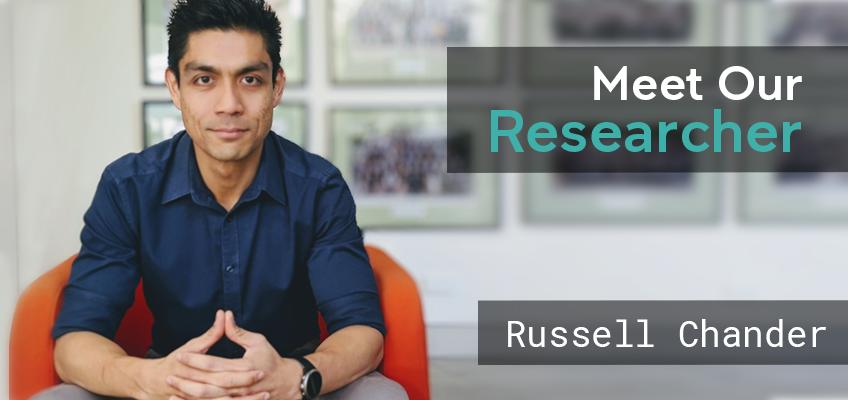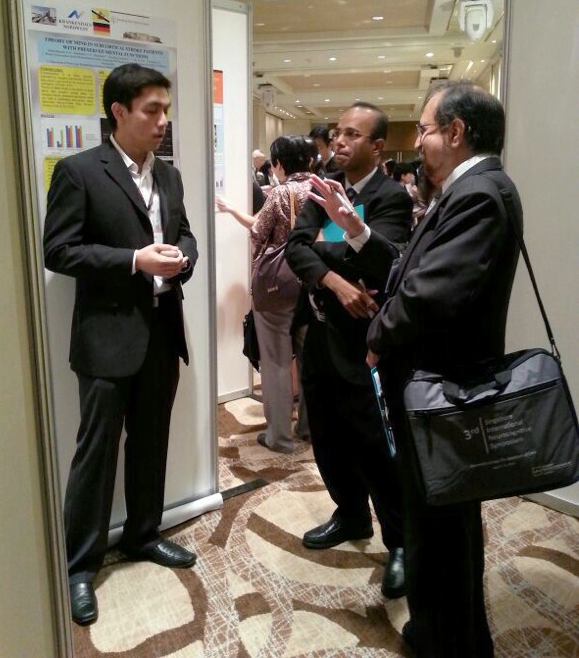19 Jun 2020

There is a large body of evidence to suggest that our ability to socialise and maintain positive relationships throughout the lifespan is affected by, and can have an effect on, ageing. Becoming part of an international collaborative effort to better understand the impact of social skills in later life on cognitive decline and dementia is what motivates Russell Chander; PhD student at CHeBA.
How did you get into researching the ageing brain?
I became aware of a Research Assistant job through a friend from university that was working at a Neurology clinic. This would be the first job I had working on projects related to dementia and Parkinson’s disease. Truth was, it was not quite what I was looking for at the time, as I was studying towards a career in advertising and public relations. I just took the job thinking it would be an interim role. However, finding my passion in it, I ended up staying for about five years and my supervisor was a great mentor and teacher who nurtured my skills and interest in research. Previously, I had some experience working as a teaching assistant in a special needs school, so that combined with this Research Assistant role helped me realise that I found significant fulfilment helping and working with people in need. For me, finding passion in what I do relates to the output I generate; does my work inject ‘good’ into the world and if I am satisfied with that ‘good’.
Did you experience a ‘defining moment’ which led you to this field?
I like to remember the first participant I saw with dementia and my first academic poster presentation. You read a lot about dementia, so you have this stereotypical idea of what a person with dementia will be like. Then you meet someone affected by the disease and your preconceptions are disrupted because no one fits neatly into that stereotype. When you meet people with dementia - sure there are moments where one or two things slip their mind - however, these people are some of the nicest, most caring and emotionally intact people I have ever met and conversed with. They love to have a chat and I realised that people with dementia and older adults in general have an extraordinary amount to offer and talk about, but few people take the time to hear them. I love sitting down and engaging with them and listening to them talk. Even though I do not provide medical advice, some of them still feel like I have helped them.
It is an incredibly rewarding feeling to have helped someone even in the smallest of ways and it piqued my interest in this area even more.

In 2013 I did an academic poster presentation and I was so excited because it was my first personal project that I could present at a conference. A visiting professor judged these presentations and had commented that although my idea was interesting, the participants I had studied were not the most suitable to prove my ideas and gave me some recommendations about how to best continue. Clearly, he did not have to do that, and in retrospect he could have shot me down rather than provided helpful criticism. In all honesty, I look back on that project and get a little embarrassed at how naively I ran it. This professor did not intentionally do that, but it was his constructive feedback that pushed me to continue and improve upon my work. That person happens to be Scientia Professor Perminder Sachdev, one of CHeBA’s Co-Directors, and little did I know then that five years later he would accept my application to embark on a PhD at CHeBA. I still think about this moment today.
Do you have any personal interests or activities which are protective behaviours against cognitive decline?
I do my best to keep physically and mentally active. My job requires a lot of mental activity, but I try to diversify this further – I do not think it is good enough to focus on one kind of mentally taxing task. I like to read, play strategy-based video games and watch documentaries and video essays. For physical activity I go to the gym a couple of times a week but these days I do my workouts at home. I also enjoy running. I find running mentally meditative in a sense because I am alone with my thoughts and I can reflect on things. I stay socially connected as much as I can and this is especially important right now. As such, I have been reaching out to family and friends a lot more online.
What are you currently researching?
My PhD project is on social cognition in older adults, which are the qualities one might need to navigate social situations. These can be, for example, showing empathy, reading the emotions and thoughts of others and how to behave appropriately in public. We are looking at this in healthy adults who are aged sixty and above in the local community, as well as those in our existing studies such as the Sydney Memory and Ageing Study and the Sydney Centenarian Study. We are doing a range of interviews and assessments that look at people’s social skills and abilities.
There is some evidence to show that impaired social cognition is a component of dementia. It might even be an early warning sign, but we still have some work left to do to figure out what that link is.
I am working on describing what the expected levels of social functioning, skills and abilities in older adults are, and whether changes occurring in these areas are normal or more indicative of something bigger like dementia.
Why is your research important?
Worldwide, the length of the average lifespan is increasing. We are seeing that a lot of adults are leading healthy lives for longer and our societies are becoming more inclusive. It is no longer the case that as we age, we should resign ourselves to sit on the sidelines. Nowadays, older adults are finding more ways to stay active, keep socially connected and remain involved in their communities. We need to understand whether older adults interact with their social environment any differently to younger people. We want a society where people of all ages can work together and I think this will depend on our understanding of how people operate in social contexts throughout the lifespan. Knowing how older adults engage socially will generate more awareness and clarity around what normative behaviour is and when cognitive decline is interfering. By extension, this might help us to further reflect on how each of us interact with and treat older people as well as each other.
What do you love about working at CHeBA?
It is not just about the feeling of making a difference but also meeting a variety of people during my research. Everyone is so interesting and has their own story. It is almost like there is not enough time in the day because when you meet someone, especially a centenarian, they have one hundred years’ worth of stories and life experience to share in a three-hour session. I want to hear so much about them. It is the element of meeting people and interacting with them which is why I picked this project over another one. When I work with people, I get a certain level of insight that I would not normally have when I work alone in a lab or behind a computer. I like being sociable with participants and I enjoy the insights they provide - every interaction is unique and interesting.
CHeBA is like a family, everyone is really connected and looks out for each other especially during this time of social isolation. The simple things like our morning coffee run, collaborative meetings and our social events in person or online, are an enjoyable part of CHeBA’s culture. We may effectively be all business during office hours, but there is always a consideration for other people as individuals; not just as employees.
What is the ultimate hope you have for your research?
I hope we can lay the groundwork for starting a conversation in the research and public communities about the importance of social skills and abilities for attaining healthy ageing, and that we can take this conversation further via international collaborative efforts. Our social wellbeing plays a role in healthy ageing and protecting against dementia. Culture also impacts this social effect and this differs across countries. We could do the most impactful research here, but it might not apply to other regions like Asia or Latin America. Engaging in international collaborations will provide a more holistic picture of how our social skills impact ageing across the globe. The more far-reaching dream would be to not only detect dementia earlier, but to also be able to prevent it. From here, I hope that we can help people avoid having dementia as much as possible and ensure that those who are affected remain healthy and productive members of society.
This interview was undertaken during the COVID-19 self-isolation period. Russell found that reaching out to friends and family, even with a brief text, helped remind him and everyone else that we are here to support each other in an effort to remain resilient and socially connected while physically isolated.
Donations are fundamental for critical research to continue following COVID-19.
If you would like to discuss supporting Russell's work specifically, or would like information
on leaving a legacy via a Gift in your Will, please contact h.douglass@unsw.edu.au.

Russell Chander is Psychiatry PhD student at CHeBA and is supported by the UNSW Scientia PhD Scholarship program. Russell graduated from the University at Buffalo (Singapore) with a Bachelor of Arts in Psychology and Communications (double major) and worked as a Clinical Research Assistant at the National Neuroscience Institute in Singapore prior to joining CHeBA. His research interests include the social cognition of older adults, how this relates to genetics, hormonal responses, neuroimaging markers and risk of cognitive decline. His thesis has predominantly drawn from the data of CHeBA’s Sydney Memory and Ageing Study and the Sydney Centenarian Study. Invaluable insights gained from face-to-face time with study participants has been one of Russell’s defining moments during his work at CHeBA.
